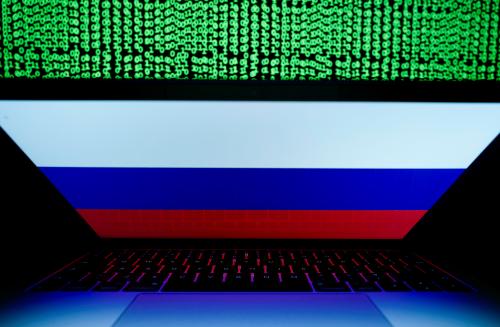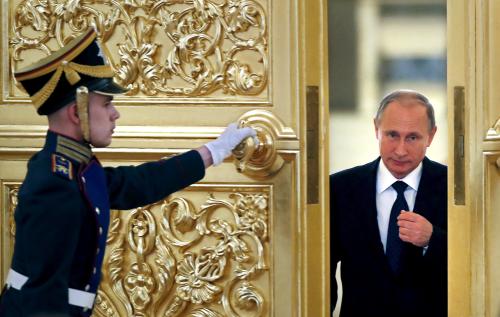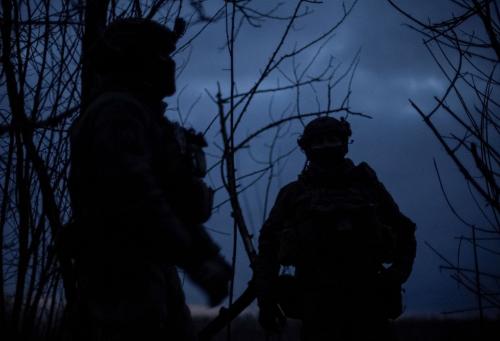What might Putin’s fourth term hold in store for Russia, its neighbors, and its relationship with the West? There is “a lot to think about, to repair, and to renovate,” noted Strobe Talbott, distinguished fellow in residence in Foreign Policy at Brookings, in an April 4 discussion of “Putin’s next act”, two weeks after Russia’s presidential elections. The panel—moderated by Alina Polyakova, David M. Rubenstein Fellow at Brookings, and featuring Talbott; Julia Ioffe, contributing writer for The Atlantic; Vladimir Kara-Murza, chairman of the Boris Nemtsov Foundation; and Angela Stent, director of the Center for Eurasian, Russian, and East European Studies at Georgetown University—warned that relations are bound to get worse before they get better.
Putin appears determined to use his multipronged toolkit to restore Russia’s “greatness,” and why should he stop if there are no consequences? As Ioffe related, during her time as a correspondent in Moscow, she won many bottles of cognac in bets with Russian political reporters “by just predicting the worst-case scenario.”
COLD WAR 2.0, OR NOBODY PUTS BABY IN A CORNER
The event started with a discussion of the tense relations between Russia and the West, escalated by a chemical attack against former Russian spy Sergei Skripal and his daughter Yulia on British soil last month and the diplomatic expulsions that followed.
Talbott argued: “We are deep into what you might call Cold War 2.0 and the end is not in sight.” But along with significant similarities to the first Cold War, he saw significant differences which made the present situation “much more serious.” Talbott was most concerned with a lack of arms control between Russia and NATO and a process “to mitigate the peril of a hot war.” But he also warned of the “rocky state” of trans-Atlantic trust and institutions, thanks to the embattled state of the European project and a U.S. president “cling[ing] to his affinity for Putin and other authoritarian leaders,” in a way that “disqualifies him as a champion and protector of Western values and interests.”
Ioffe painted an even bleaker picture, arguing that Putin—“still trying to renegotiate the terms of surrender in the Cold War” and to prove that Russia is a peer to the West and “not a recalcitrant child that you punish”—had been surprised and boxed in by the Western response to the Skripal attack. “Nobody puts baby in a corner,” she said. “I have a feeling that there’s going to be another kind of spectacular egregious act that he initiates in the coming year to get himself out.” Ioffe fears that a “new iron curtain” would hurt Russians who want to travel to the West—especially the educated classes. She posited that U.S.-Russian relations would not improve as long as Putin was alive.
Stent did see some interest from the Kremlin, as well as from U.S. President Donald Trump and European leaders, for an off-ramp. While Trump signaled interest in a summit with Putin, Russians took the initiative to announce it, perhaps “trying to soften everything” before noted hawks Mike Pompeo and John Bolton replace outgoing Secretary of State Rex Tillerson and National Security Adviser H.R. McMaster—both of whom “sound[ed] the alarm bells about Russia” on their way out.
“STEAL IN RUSSIA, BUT SPEND IN THE WEST”
Stent also noted that Russia was economically integrated with the West, creating relationships of dependency with some Western businesses and making it harder to respond.
“The corruption aspect of this regime is certainly integrated,” Kara-Murza argued. “For everything that they did back in the day, members of the Soviet Politburo didn’t keep their money in Western banks, they didn’t buy real estate in Florida and the South of France or in London…they didn’t send their kids to study in Western schools, they didn’t send their wives or their mistresses to live abroad.” Today’s oligarchs, owing their fortunes to their closeness to Putin, “steal in Russia, but spend in the West.” Kara-Murza decried Western countries as complicit in welcoming “people who perpetrate corruption and human rights abuses in Russia on [its] soil and in [its] banking system,” but praised Magnitsky Act legislation passed in the United States and later in Canada, Estonia, Latvia, and Lithuania.
“ELECTIONS” DON’T TEST PUTIN’S “POPULARITY”
“Elections in Russia have long ago lost [their] purpose,” argued Kara-Murza. Rules and procedures “were constantly shifted” ahead of the March 18 presidential election, while “the outcome was never in doubt.” Monitoring by anti-corruption foundations and other civil society groups on election day revealed that numerous violations took place, including ballot stuffing. Moreover, it is “not difficult to win an election when your opponents are not actually on the ballot,” Kara-Murza noted. Both major Russian opposition figures who were planning to challenge Putin in these elections, Boris Nemtsov and Alexei Navalny, were unable to do so, he pointed out—the former because he was killed three years ago on a bridge near the Kremlin, and the latter because he was barred by Russia’s Central Electoral Commission and subsequently the Supreme Court. Thus, Putin’s “so-called popularity” has never really been tested. “If this regime is as popular as it says it is, why is it so afraid to let the Russian people vote?”
Ioffe, relatedly, spoke about the tragic fire at a mall in the Siberian city of Kemerovo on March 25, where dozens of children and adults were killed. “When Putin, the very popular Putin, came in that night, the streets were cleared,” she said. “He did not meet with the people of Kemerovo and the governor of the region apologized, not to the people, but to the president. Which also tells you about who is accountable to whom and the popularity of the president.”
Jordanna Dulaney, an intern with the Center on the United States and Europe and the Project on International Order and Strategy, contributed to this post.






Commentary
Further down the spiral: Russia and the West after Putin’s re-“election”
April 6, 2018